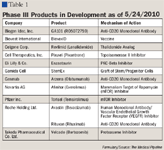- Safety & Recalls
- Regulatory Updates
- Drug Coverage
- COPD
- Cardiovascular
- Obstetrics-Gynecology & Women's Health
- Ophthalmology
- Clinical Pharmacology
- Pediatrics
- Urology
- Pharmacy
- Idiopathic Pulmonary Fibrosis
- Diabetes and Endocrinology
- Allergy, Immunology, and ENT
- Musculoskeletal/Rheumatology
- Respiratory
- Psychiatry and Behavioral Health
- Dermatology
- Oncology
Robust NHL drug pipeline calls for comparative trials
Non-Hodgkin's lymphoma (NHL) has several subtypes, with subtle variations, which leads to reduced effectiveness of standardized therapies. The introduction of rituximab, which targets B-cells, has had a positive effect on the management of NHL, but much still needs to be accomplished.

Key Points
Non-Hodgkin's lymphoma (NHL) is the most common hematological cancer in the United States, causing the most deaths among these types of cancer. This disease has several subtypes, with subtle variations, which leads to reduced effectiveness of standardized therapies. The introduction of rituximab, which targets B-cells, has had a positive effect on the management of NHL, but much still needs to be accomplished.

COMMENTARY: A HEALTH PLAN PERSPECTIVE
The area is rich with potential new products and new applications of existing products for the treatment of NHL. Agents such as bortezomib, lenalinamide, and bevacizumab are undergoing late-stage trials for NHL. Inotuzumab ozogamicin, an anti-CD22 monoclonal antibody, is in phase 2 clinical trials. Its different mechanism of action from rituximab makes it a likely candidate for combination therapy for NHL, including those with rituximab. In addition, a patient-specific vaccine for NHL is under development.
For health plans, these trials mean that the treatment options for both untreated and refractory NHL are likely to expand significantly. One issue is the possibility of significant regional variation of NHL treatment with the expansion of potential therapies. To avoid wasted resources on less-than-optimal treatments, direct comparative trials of multiple treatment options are essential to establish clinical effectiveness and then cost-effectiveness. Without the development of this critical evidence, health plans are likely to be faced with the need to accept and pay for all treatment regimens that have FDA approval, which can only serve to potentiate acceleration in cost of care for this relatively common malignancy.
-Gary Owens, MD, president,Gary Owens Associates, Glen Mills, PA
REFERENCES
1. Jemal A, Siegel R, Ward E, et al: Cancer statistics, 2008. CA Cancer J Clin. 2008;58:71–96.
2. Knight C, Hind D, Brewer N, et al: Rituximab (MabThera) for aggressive non-Hodgkin's lymphoma: Systematic review and economic evaluation. Health Technol Assess. 2004 Sep;8(37):iii, ix-xi, 1–82.
Copyright 2010 by The Medical Pipeline, LLC, the leading intelligence source on devices, diagnostics and drugs. All rights reserved. For more information, please visit http://www.tmp-pipeline.com.
Coalition promotes important acetaminophen dosing reminders
November 18th 2014It may come as a surprise that each year Americans catch approximately 1 billion colds, and the Centers for Disease Control and Prevention estimates that as many as 20% get the flu. This cold and flu season, 7 in 10 patients will reach for an over-the-counter (OTC) medicine to treat their coughs, stuffy noses, and sniffles. It’s an important time of the year to remind patients to double check their medicine labels so they don’t double up on medicines containing acetaminophen.
Support consumer access to specialty medications through value-based insurance design
June 30th 2014The driving force behind consumer cost-sharing provisions for specialty medications is the acquisition cost and not clinical value. This appears to be true for almost all public and private health plans, says a new report from researchers at the University of Michigan Center for Value-Based Insurance Design (V-BID Center) and the National Pharmaceutical Council (NPC).
Management of antipsychotic medication polypharmacy
June 13th 2013Within our healthcare-driven society, the increase in the identification and diagnosis of mental illnesses has led to a proportional increase in the prescribing of psychotropic medications. The prevalence of mental illnesses and subsequent treatment approaches may employ monotherapy as first-line treatment, but in many cases the use of combination of therapy can occur, leading to polypharmacy.1 Polypharmacy can be defined in several ways but it generally recognized as the use of multiple medications by one patient and the most common definition is the concurrent use of five more medications. The presence of polyharmacy has the potential to contribute to non-compliance, drug-drug interactions, medication errors, adverse events, or poor quality of life.
Medical innovation improves outcomes
June 12th 2013I have been diagnosed with stage 4 cancer of the pancreas, a disease that’s long been considered not just incurable, but almost impossible to treat-a recalcitrant disease that some practitioners feel has given oncology a bad name. I was told my life would be measured in weeks.
